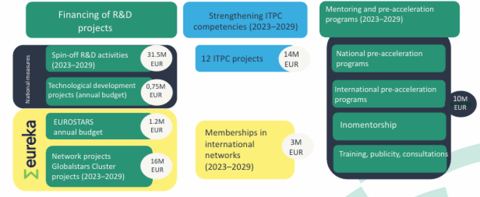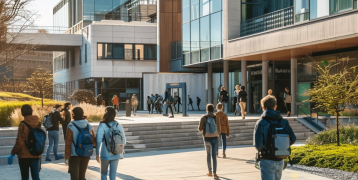Aligning North Macedonia’s Higher Education with European Research & Innovation Trends

On 6 March 2025, the Policy Learning Platform organised a matchmaking at the request of National Council for Higher Education and Scientific Research of the Republic of North Macedonia.
Objective and context of the matchmaking
The National Council for Higher Education and Science-Research was established in 2021 under the Law on Higher Education to ensure, assess, develop, and promote the quality of higher education and scientific research in the Republic of North Macedonia. It operates as an independent entity, supported by the Ministry of Education and Science of the Republic of North Macedonia, and reports to the Parliament and Government.
A key responsibility of the Council is proposing the National Programme for Science and Research. This programme defines priorities for research and innovation, plans infrastructure and staffing needs, and establishes monitoring indicators. A draft, aligned with the National Smart Specialisation Strategy 2024–2027, was prepared in 2024 with input from national stakeholders and experts.
The matchmaking aimed to enhance the relevance of the National Programme for Science and Research and its alignment with European good practices. Specifically, it sought to ensure that the programme incorporates the latest trends and European initiatives in research and innovation policies, including university-industry collaboration and research valorisation, to align with the national Smart Specialisation Strategy (S3).
Policy Challenges
The National Programme for Science and Research aims to increase public investment in R&D, as it remains significantly below the EU average (0.38% of GDP in North Macedonia compared to 2.27% of GDP in the EU). Moreover, North Macedonia’s science and research ecosystem faces three main challenges:
- Human capital is lacking and/or underutilised: brain drain—the departure of talented young researchers—poses a significant threat.
- Research infrastructure is underdeveloped: limited access to state-of-the-art equipment and facilities restricts the scope and quality of research.
- Weak university-industry collaboration: the weak connection between academia and industry impedes the translation of research findings into practical applications, hindering economic growth and innovation.
The matchmaking discussions addressed various strategic and practical considerations related to the National Programme for Science and Research, focusing on: increasing R&D funding, investing in human capital, enhancing research infrastructure, promoting international cooperation, and fostering university-industry collaboration.
Peers
- Balzhan Orazbayeva, University Industry Innovation Network (UIIN), the Netherlands
- Eglė Celiešienė, Program Coordinator (R&D), Research Council of Lithuania, Lithuania
- Emil Erjavec, Professor for Agricultural Policy and Economics, University of Ljubljana, Slovenia
- Nina Arnhold, International Higher Education Expert, the Netherlands
Key insights shared during the matchmaking
During the matchmaking, several key recommendations were shared by peers to help the National Council for Higher Education and Science-Research.
- Ensure commitment from a coalition of willing (identify change agents and engage in S3 priorities consultations) to mobilise support for science.
- Set a legal framework mandating 1% GDP allocation for research and innovation.
- Establish an independent agency to manage research funding, ensuring long-term commitment for research and innovation and separation from political influence (learn from European agencies such as the Research Council of Lithuania).
- Leverage EU pre-accession and accession funds, including cohesion funds and Horizon Europe, for research infrastructures.
- Develop objective, national evaluation criteria (both quantitative and qualitative) for researchers.
- Create and continuously update a national database of researchers.
- Support young researchers through structured PhD and postdoctoral funding schemes, including international mobility programs (with repayment conditions if researchers do not return).
- Provide financial incentives for researchers who secure prestigious international projects.
- Introduce targeted initiatives, such as innovation voucher schemes, to stimulate university-industry partnerships.
- Adapt policy tools inspired by good practices, such as:
- Swiss Smart Factory Digitalisation Parkour: practical demonstrations of Industry 4.0 technologies to SMEs through applied research projects, inspiring the establishment of competence centres to accelerate the diffusion of Industry 4.0 technologies and promote applied research projects.
- Basque Interregional Voucher Scheme: a voucher scheme to promote SMEs’ use of Digital Innovation Hubs in other European regions, inspiring the development of a voucher scheme for researchers and SMEs to use centres of competence and research infrastructures in other European regions.
- Operational Group (OG): collaborative platforms addressing sectoral challenges through innovative pilot projects in agri-food and forestry, inspiring the development of collaborative pilot projects in S3 priorities.
- Primas Proof of Concept Programme: public-private partnerships co-funded by regional industries and public bodies, facilitating early-stage research-industry collaboration, applicable to proof-of-concept developments aligned with S3 priorities.

- Have a good understanding of current research capacities to identify promising research directions (see for example the Federal Report on Research and Innovation (BuFI))
- Use data-driven monitoring platforms such as Catalonia’s RIS3-MCAT platform, which employs semantic analysis and data visualisation to enhance strategic decision-making.
- Organise working groups with public-private stakeholders to align regional research initiatives with national S3 priority areas, drawing inspiration from the Auvergne region good practice: Academic Sourcing.
- Foster interregional exchanges, notably with Baltic and other European countries, to integrate good practices and enhance policy development.






